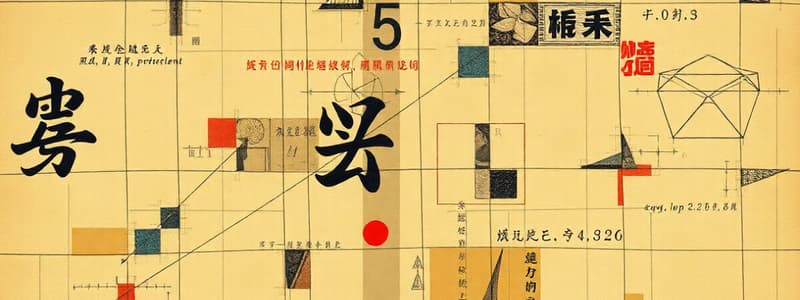Podcast
Questions and Answers
What was the primary focus of Chinese mathematics during its early development?
What was the primary focus of Chinese mathematics during its early development?
- Theoretical exploration of mathematical concepts
- Development of advanced calculus
- Creation of complex geometric theories
- The art of calculation for practical and spiritual purposes (correct)
Which of the following numeral systems did the Chinese independently develop?
Which of the following numeral systems did the Chinese independently develop?
- Both binary and decimal systems (correct)
- Only the binary system
- Only the decimal system
- Neither binary nor decimal systems
What material was primarily used to create the earliest Chinese number system?
What material was primarily used to create the earliest Chinese number system?
- Bamboo
- Cattle bones and tortoise shells (correct)
- Paper
- Metal rods
How did the Chinese counting rods represent numbers?
How did the Chinese counting rods represent numbers?
What does the Chinese Abacus represent for numbers greater than five?
What does the Chinese Abacus represent for numbers greater than five?
What is the title of the practical handbook of mathematics from ancient China?
What is the title of the practical handbook of mathematics from ancient China?
Which of the following is NOT a characteristic of Chinese mathematics?
Which of the following is NOT a characteristic of Chinese mathematics?
In what time frame did mathematics emerge independently in China?
In what time frame did mathematics emerge independently in China?
What mathematical concept is Sun Tzu known for in his work?
What mathematical concept is Sun Tzu known for in his work?
What was Yang Hui's contribution to mathematics?
What was Yang Hui's contribution to mathematics?
What value does each row, column, and diagonal in the Lo Shu square sum up to?
What value does each row, column, and diagonal in the Lo Shu square sum up to?
During which centuries did Sun Tzu flourish?
During which centuries did Sun Tzu flourish?
What does the dualistic theory of Yin and Yang represent in terms of numbers in the context of the magic square?
What does the dualistic theory of Yin and Yang represent in terms of numbers in the context of the magic square?
Which ancient Chinese mathematical classic contains the oldest representation of what is known as Pascal's triangle?
Which ancient Chinese mathematical classic contains the oldest representation of what is known as Pascal's triangle?
What is the significance of the Lo Shu square in ancient Chinese culture?
What is the significance of the Lo Shu square in ancient Chinese culture?
What type of equations did Sun Tzu investigate while working on astronomy and calendar development?
What type of equations did Sun Tzu investigate while working on astronomy and calendar development?
What was the primary focus of Qin Jiushao's work in mathematics?
What was the primary focus of Qin Jiushao's work in mathematics?
Which of the following problems does the Shushu jiuzhang address?
Which of the following problems does the Shushu jiuzhang address?
Which significant mathematical advancement is Liu Hui known for?
Which significant mathematical advancement is Liu Hui known for?
What was a key difference between ancient Chinese mathematics and Greek mathematics?
What was a key difference between ancient Chinese mathematics and Greek mathematics?
What structure did Shushu jiuzhang have?
What structure did Shushu jiuzhang have?
Which of the following contributions is Liu Hui NOT associated with?
Which of the following contributions is Liu Hui NOT associated with?
What was one of the applications of mathematics in the context described?
What was one of the applications of mathematics in the context described?
What was the significance of Jiuzhang Suanshu in Chinese mathematics?
What was the significance of Jiuzhang Suanshu in Chinese mathematics?
Flashcards are hidden until you start studying
Study Notes
Chinese Mathematics
- Chinese mathematics emerged independently in China by the 11th century BCE.
- The Chinese independently developed a real number system that includes significantly large and negative numbers, more than one numeral system (binary and decimal), algebra, geometry, number theory and trigonometry.
### Nature of Chinese Mathematics
- Chinese mathematics was defined by Chinese times as the “art of calculation”.
- This art was both a practical and spiritual one, and covered a wide range of subjects from religion and astronomy to water control and administration.
Materials Used:
- Oracle Bone Script: First ancient Chinese number system written on flat cattle bones and tortoise shells. The largest number found using this method was 30,000.
- Counting Rods: The second form of Chinese number used small bamboo rods arranged to represent the numbers 1 to 9. This method was based on the decimal system and employed a positional value system.
- Abacus: The first Chinese Abacus or suanpa uses beads sliding on a wire to represent numbers. For numbers up to 4, slide the required number of beads in the lower part up to the middle bar. For five or above, slide one bead above the middle bar down (representing 5), and 1, 2, 3 or 4 beads up to the middle bar for the numbers 6, 7, 8, or 9 respectively.
Nine Chapters on the Mathematical Art
- Also called “JiuzhangSuanshu”.
- A practical handbook of mathematics consisting of 246 problems intended to provide methods to solve everyday problems.
- Played a fundamental role in the development of mathematics in China.
- The concept of proof is important to note.
- It became an important tool in the education of civil servants, covering hundreds of problems in practical uses such as trade, taxation, engineering and the payment of wages.
Contribution to the Life of People
- The construction of canals, dams, and other water-infrastructure created a safer environment for the society.
- Jiuzhang Suanshu or “Nine Chapters on the Mathematical Art” is regarded as an important tool in the education of civil servants, covering problems in practical uses such as trade, taxation, engineering and the payment of wages.
Prominent People
- Liu Hui: (220-280 CE) Solved linear equations using matrices (similar to Gaussian elimination). Calculated the value of Pi correct to five decimal places. He also formulated the early forms of integral and differential calculus.
- Yang Hui: (1238-1319 CE) Flourished c. 1261–75, Qiantang, Zhejiang province, China. Yang’s Jiuzhang suan fa zuan lei (c. 1275; “Reclassification of the Mathematical Procedures in the Nine Chapters”)—a compilation and reclassification, (c. 100 BC–AD 50; Nine Chapters on the Mathematical Procedures)—contains the oldest representation of what is known in the West as Blaise Pascal’s triangle.
- Qin Jiushao: (1202-1261 CE) Developed a method of solving simultaneous linear congruence. He started formulating the solution of quadratic, cubic and high power equations using method of repeated approximations. Wrote his only mathematical book, now known as Shushu jiuzhang during mourning period. His book is divided into nine “categories,” each containing nine problems related to calendrical computations, meteorology, surveying of fields, surveying of remote objects, taxation, fortification works, construction works, military affairs, and commercial affairs.
- Sun Tzu: (200 CE) SunTzu was a Chinese mathematician, flourishing between the 3rd and the 5th century A D. Interested in astronomy and trying to develop a calendar, he investigated Diophantine equations. He is only known for authoring Sun Tzu Suan Ching (pinyin: Sun Zi Suan Jing; literally,"Sun Tzu's Calculation Classic"), which contains the Chinese remainder theorem.
- The Lo Shu Square (650 BCE) Sometimes called the Magic Square, is also at the root of ancient feng shui astrology, the flying star school Xuan Kong, as well as the I-Ching. The Lo Shu square is a 3X3 square where each row, column and diagonal adds up to 15.
- Contribution to the development of math: The existence of the dualistic theory of YIN and YANG, Yin represents even numbers and Yang represents odd numbers through the 3x3 magic square.
- The development of the decimal place value system: Used both in counting rods and the abacus.
Studying That Suits You
Use AI to generate personalized quizzes and flashcards to suit your learning preferences.




